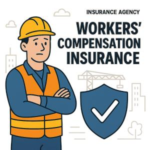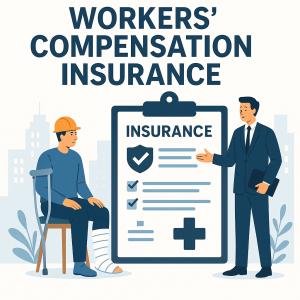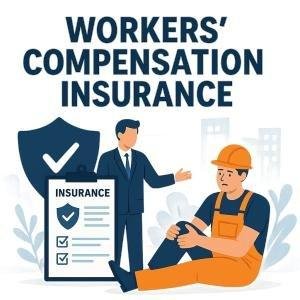In the dynamic landscape of light industrial operations across Georgia, ensuring comprehensive worker’s compensation insurance is not merely a regulatory requirement but a strategic imperative. Light industrial staffing agencies face unique challenges when securing workers’ comp coverage that adequately protects both their workforce and business interests. This article delves into the critical considerations surrounding workers’ compensation insurance for light industrial staffing firms in Georgia, examining regulatory mandates, risk management strategies, and cost-effective solutions tailored to this sector. Understanding these factors is essential for employers aiming to maintain compliance, mitigate liabilities, and foster a safe working environment in Georgia’s competitive light industrial market.
Table of Contents
Understanding Workers’ Compensation Requirements for Light Industrial staffing in Georgia
In the state of Georgia, employers in the light industrial sector must navigate specific legal obligations to ensure proper workers’ compensation coverage. This insurance safeguards both the employees and the business by covering medical expenses and lost wages resulting from work-related injuries or illnesses. Understanding the scope of these requirements is critical for staffing firms that place workers in manufacturing, warehousing, and assembly roles, where the risk of injury is elevated. employers must not only secure adequate coverage but also maintain compliance wiht the Georgia State board of Workers’ Compensation regulations, which stipulate mandatory reporting procedures and timely claims handling.
Key considerations for staffing agencies include:
- Verification of coverage for each client and temporary worker to avoid coverage gaps.
- Clear dialogue of workers’ comp benefits and claims processes to placed employees.
- Assessment of classification codes that affect premium rates based on the specific job functions assigned.
- Implementation of robust safety training protocols to minimize incidents and reduce claim frequency.
| Job Type | Typical Classification Code | risk Level |
|---|
| Assembly Line Worker | 8810 | Medium |
| Warehouse laborer | 8017 | High |
| Machine Operator | 7720 | High |
Evaluating Risk Factors and Coverage Options for Light Industrial Employees
When assessing risk factors for light industrial employees, it is critical to identify the specific hazards prevalent in their work environment. These risks often include repetitive motion injuries, exposure to machinery, slips and falls, and manual material handling. Additionally, the workforce’s varying skill levels and experience introduce further complexities in risk management. Employers must prioritize regular safety training and upkeep of equipment to reduce the prevalence of workplace accidents. A comprehensive understanding of these elements helps in tailoring workers’ compensation policies that address the unique challenges faced by this sector.
Coverage options should be evaluated not only based on compliance with Georgia’s workers’ comp regulations but also on the flexibility to cover diverse injury types and indirect costs such as wage replacement and rehabilitation. Essential coverage features include:
- Medical benefits tailored for industrial injury treatment
- Lost wages compensation aligned with average industry pay
- Third-party liability coverage in case of external claims
- Risk mitigation services like safety program support
| Risk Factor | Common Injuries | Recommended Coverage |
|---|
| Machinery Operation | Crush injuries, lacerations | Medical and disability benefits |
| Material Handling | Strains, sprains | Wage replacement, physical therapy |
| Slips and Falls | Fractures, concussions | Medical expenses, rehabilitation |
Best Practices for Managing Workers’ Comp Claims in Light Industrial Staffing
Effectively managing workers’ compensation claims in light industrial staffing requires a proactive approach centered on communication and documentation. Ensuring a clear, streamlined reporting process enables injured workers to receive timely medical attention and expedites claims resolution. Employers should prioritize regular training for supervisors on recognizing injury signs and documenting workplace incidents accurately. Additionally, collaborating with insurance providers to understand coverage details helps prevent claim denials and delays.
Implementing safety protocols tailored to the unique risks of light industrial environments is essential. Maintaining a robust injury prevention program minimizes claim frequency and severity. Essential best practices include:
Here’s a quick reference guide outlining crucial steps for managing claims efficiently:
| Step | Action | Benefit |
|---|
| 1 | Immediate injury reporting | Faster medical care |
| 2 | Thorough incident documentation | Clear claims evidence |
| 3 | Continuous communication | Claims openness |
| 4 | Return-to-work coordination | Reduced rehabilitation time |
Recommendations for Selecting the Right workers’ Compensation Insurance Provider in Georgia
Choosing the ideal workers’ compensation insurance provider in Georgia requires a thorough evaluation of their experience with light industrial staffing firms.Look for insurers who specialize in your industry, as thay understand the unique risks and regulatory requirements associated with temporary or contract labor. Additionally, consider the company’s financial stability and claims processing efficiency-these factors significantly impact your coverage reliability and your workforce’s peace of mind. Make sure the provider offers clear guidance on compliance with Georgia’s specific workplace injury laws to avoid potential legal pitfalls.
Another critical factor is the range of services and customizable policies offered. Providers that include risk management consultations, dedicated customer support, and flexible premium options can create tailored solutions that fit your business size and risk profile.Below is a quick comparison to help you assess potential providers:
| Provider Feature | Basic Coverage | Risk Management | customizable Plans |
|---|
| Industry Experience | Moderate | ✓ | ✓ |
| Claims Processing Speed | Standard | ✓ | ✓ |
| Customer Support | Email Only | Phone & Email | 24/7 Dedicated |
- Verify licensing and reputation within Georgia’s insurance market.
- request multiple quotes to benchmark pricing and coverage options.
- Ask for references or testimonials from othre light industrial staffing companies.
Q&A
Q&A: Light Industrial Staffing Workers’ Comp Insurance in Georgia
Q1: What is workers’ compensation insurance for light industrial staffing in Georgia?
A1: Workers’ compensation insurance is a mandatory coverage that protects both employers and employees in the light industrial staffing sector in Georgia. It provides medical benefits and wage replacement to workers who suffer job-related injuries or illnesses, while also shielding employers from potential lawsuits related to workplace accidents.
Q2: Why is workers’ comp insurance notable for light industrial staffing agencies in Georgia?
A2: Light industrial staffing agencies place temporary workers in various industrial environments that often pose physical risks. Workers’ comp insurance ensures these employees receive prompt medical care and financial support if injured, fostering a safer workplace and compliance with Georgia state laws. It also helps staffing firms manage liability and maintain operational continuity.
Q3: are staffing agencies in Georgia legally required to carry workers’ compensation insurance?
A3: Yes. In Georgia, all employers with three or more employees, including those that supply workers through staffing arrangements, are generally required to carry workers’ compensation insurance. This includes light industrial staffing agencies which must ensure coverage for their temporary and contract workers.
Q4: How does workers’ comp coverage work for temporary employees placed by light industrial staffing firms?
A4: Workers’ comp coverage for temporary workers typically follows the employer of record-in this case, the staffing agency. The agency is responsible for securing coverage and handling claims, even though workers perform duties at the client’s site. Clear agreements between staffing agencies and client companies are crucial to define responsibilities.
Q5: What factors influence the cost of workers’ compensation insurance for light industrial staffing firms in Georgia?
A5: Several factors impact premiums,including the number of workers employed,payroll size,job classifications,workplace safety record,and prior claims history. As light industrial roles frequently enough involve higher risk activities, staffing firms may see higher rates compared to other sectors but can reduce costs through safety protocols and effective risk management.
Q6: Can light industrial staffing firms in georgia obtain workers’ comp insurance through the state fund or private carriers?
A6: Georgia allows employers to purchase workers’ compensation coverage through private insurance carriers or self-insure if they meet certain criteria. there is no state fund providing coverage, so agencies typically contract with private insurers or join group funds tailored to staffing firms.
Q7: How can light industrial staffing agencies ensure compliance with Georgia’s workers’ comp laws?
A7: Agencies should maintain up-to-date policies, secure appropriate insurance coverage, keep accurate payroll and employee records, and regularly communicate with clients about responsibility for coverage. Consulting with insurance professionals and legal experts can also facilitate regulatory compliance and risk mitigation.
Q8: What are the consequences for light industrial staffing firms in Georgia that fail to carry workers’ compensation insurance?
A8: Non-compliance can lead to significant penalties, including fines, stop-work orders, and potential civil liability for workplace injuries. Additionally, employers may face lawsuits for damages that workers’ comp insurance would typically cover, increasing financial risks dramatically.
Q9: Are there specific challenges unique to staffing companies in managing workers’ comp insurance for light industrial employees?
A9: Yes. Challenges include accurately classifying temporary workers’ job duties, coordinating coverage responsibility between staffing firms and client employers, and managing claims that arise from diverse worksite environments. Clear contractual agreements and thorough risk assessments are critical in addressing these complexities.
Q10: What best practices should light industrial staffing firms in Georgia follow regarding workers’ compensation insurance?
A10: Best practices include conducting regular safety training, performing workplace hazard assessments, maintaining obvious communication with clients about insurance and liability, choosing insurers experienced with staffing industry risks, and actively managing claims to reduce costs and improve employee outcomes.
This Q&A provides a professional overview essential for light industrial staffing firms operating in Georgia, emphasizing compliance, risk management, and the critical role of workers’ compensation insurance.
The Way forward
securing comprehensive workers’ compensation insurance is a critical step for light industrial staffing agencies operating in Georgia. It not only ensures compliance with state regulations but also safeguards both the agency and its workforce from the financial risks associated with workplace injuries. By partnering with experienced insurance providers and tailoring coverage to meet the unique demands of the light industrial sector, businesses can foster a safer work environment and maintain operational continuity. Prioritizing workers’ comp insurance ultimately supports sustainable growth and reinforces a commitment to employee well-being in Georgia’s dynamic labor market.
“This content was generated with the assistance of artificial intelligence. While we strive for accuracy, AI-generated content may not always reflect the most current information or professional advice. Users are encouraged to independently verify critical information and, where appropriate, consult with qualified professionals, lawyers, state statutes and regulations & NCCI rules & manuals before making decisions based on this content.










